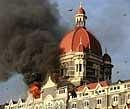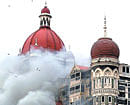

Terror suspect Headley was questioned by an inspector in August and deceptive answers about his travels abroad helped officials began to unravel his alleged double life, Wall Street Journal reported quoting US Law Enforcement officials.
Westerners have largely played a supportive role in terror activities, but Headley's ability to travel freely on a US passport to Pakistan, India and Denmark gave him high value and allowed him to play a key role in 2008 Mumbai attacks, US officials said.
The 49-year old Chicago man was charged this week for helping plot the terror attack in Mumbai, a year ago that killed 166 people.
Federal agents, already suspicious of him, used his return to the US this summer as an opportunity, according to officials.
A border inspector asked Headley about his overseas travel, Headley said he was working for a company called First World Immigration Service.
First World is a business that allegedly provided Headley with cover as he travelled to scout terrorist targets for Lashkar-e-Taiba, the group responsible for the November 2008 assault in Mumbai, according to the federal charges.
Agents searched Headley's luggage and found it "contained no papers or other documents relating to such a business," according to court documents. They also searched tax records and found no record of income paid to Headley by the company, court records show.
US officials said the questioning at the airport gave a significant boost to the investigation.
Headley was confronted on return to the US from a trip to Denmark in which he was scouting potential targets, authorities alleged. He is also being charged with planning an armed assault on a Danish newspaper that published cartoons of the Muslim Prophet Muhammad.
Authorities said little more about the airport interview, including where it happened or why they had become suspicious of Headley. But court records showed that federal surveillance of Headley, who is an American, accelerated afterward.
Headley has been charged on twelve counts including conspiracy to bomb public places in India, to murder and maim persons in India and Denmark and provide material support to foreign terrorist plots and to provide material support to Pakistan based LeT.
He has also been charged of aiding and abetting murder of US citizens in India.
The paper said Headley's case is the most potent example of a US born radical. Law enforcement and terrorism specialists said Lashkar's alleged deployment of Headley underscored the usefulness of recruits with US passports in terror plots.
Headley travelled to India and Pakistan over nearly two years to videotape targets and brief his co-conspirators in the Mumbai attacks, according to the federal charges.
"It's exactly the way you'd think al Qaeda would want to use operatives," said Evan Kohlmann, who has testified on Lashkar as an expert witness in US and British courts.
Under direction from the Pakistani terror group, Headley appears to have been a skilled operative leading a carefully cultivated double life. He posed as the representative of the global immigration firm on more than a dozen international missions, including to scout potential attacks in India and Europe.
Headley's cellphone was registered to a dead man, as was his Chicago apartment, according to the Federal Bureau of Investigation. He changed his name from Daood Gilani in 2006 to further his cover, according to the FBI.
"There's little question that [Lashkar] would like to extend its reach beyond areas where it has operated in the past," said one US counterterrorism official.
"The group has connections to other militants who have shown interest in conducting attacks throughout the region and in the West," he said.
Headley's alleged role in the Mumbai attack represents a significant expansion of Lashkar's use of Westerners, said Evan Kohlmann, who has testified on the group as an expert witness in US and British courts.
There are pockets of Lashkar supporters in the US, including San Diego and Northern Virginia, as well as cities in Florida and in the Northeast, say current and former counterterrorism officials.